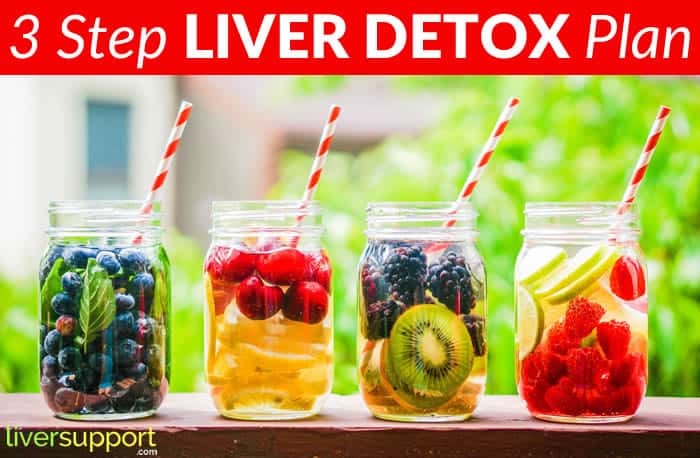Liver Detox Simplified: 3 Step Liver Detox Plan
Discover several things you can do to detoxify your liver and improve its function.
The liver is one of the most critical organs in the body, necessary for maintaining a healthy metabolism, circulation, balanced hormones, detoxifying our blood, along with digestion of food. When the liver is not functioning properly, symptoms such as digestive issues, lethargy and fatigue, autoimmune conditions and skin rashes begin to appear.
Just under the ribs in the upper right side of the abdomen, the liver weighs in at about 3.1 pounds, and is made up of smaller units of cells called lobules, which transport blood and bile for processing. Blood from the digestive tract comes into the liver rich in nutrients, and carrying chemicals from drugs, exposure to environmental toxins and processed foods which need to be eliminated from the body. Once blood arrives in the liver, these nutrients and chemicals are metabolized, stored, altered, eliminated or returned to the blood supply as necessary.
The liver can become stressed from a poor diet, high in over-processed foods, sugars and fats. When too much fat or sugar is ingested, the liver must continually process them out of the blood stream. Over time, the liver becomes clogged with fat, causing the condition non-alcoholic fatty liver disease (NAFLD) – which can progress to cirrhosis over time.
Exposure to toxic chemicals from chemically sprayed foods, manufacturing and pollution can wreak havoc on the liver. Household chemicals such as cleaning products also tax the liver, as do medications and drugs. All of these substances must be filtered out of the body and the liver is the primary organ for the job. When we are over-exposed to these toxic chemicals over time, the liver itself becomes toxic and liver function suffers.
3 Ways to Detoxify Your Liver
There are several things that can be done to detoxify your liver and improve its function:
- Healthy Diet: An anti-inflammatory diet that is low in sugars and fats and high in fiber and antioxidants will reduce inflammation throughout your body, and your liver, allowing it to recover and detoxify. Green vegetables such as arugula, spinach and kale have antioxidant properties and offer a range of vitamins and minerals. Cruciferous vegetables like broccoli and cauliflower are packed with enzymes and potassium, a necessary mineral for detoxifying the liver. Fruits high in antioxidants such as berries and melons offer magnesium, calcium and potassium, which support liver function. A healthy diet low in fat and sugar, rich in vegetables and nutrients supports the whole body in the detoxification process.
- Supplements: Milk thistle, dandelion root, green tea, and turmeric have all been shown to support liver function and detoxification. Milk thistle contains silymarin, a compound that has been shown to protect liver cells and act as an antioxidant. Dandelion root acts as a diuretic, removing unwanted toxins from the body through the kidneys, reducing the load on your liver. Green tea and turmeric have antioxidant properties that reduce toxicity and inflammation in your liver and throughout your body.
- Go Green: Avoid exposure to toxic chemicals in the environment as well as around the house. Use safe cleaning supplies such as vinegar and baking soda rather than toxic chemical cleaners. Avoid reheating food in plastic containers in order to avoid Bisphenol A (BPA), a chemical that mimics estrogen in the body. BPA has been shown to unbalance the hormone system, and can further tax the liver. Pesticides sprayed on crops can also reduce liver function, so fruits and vegetables should always be washed prior to consumption. Pay special attention to washing fruits and vegetables with rough textures on their skins such as peaches, in order to remove unwanted chemicals. Many pesticides have been shown to be hormone disruptors, carcinogens and neurotoxins. Antibiotics and synthetic hormones used in raising farm-raised chicken, beef and fish make their way to the dinner table and can disrupt our hormonal systems and tax your liver.
By taking care to maintain a healthy lifestyle that includes a healthy diet, supplementation and minimizing our toxic load, we can give our liver the best possible environment in which to function.
Han, E. (2010). Ways to reduce your exposure to BPA. Kitchn. Retrieved on 9/16/16 from http://www.thekitchn.com/ways-to-reduce-your-exposure-t-106536.
Lai, H.S.; Lin, W.H.; Chen, P.R.; Wu, H.C.; Lee, P.H., Chen, W.J. (2005). Effects of a high-fiber diet on hepatocyte apoptosis and liver regeneration after partial hepatectomy in rats with fatty liver.
JPEN J Parenter Enteral Nutr. 29(6):401-7. Retrieved on 9/16/16 from http://www.ncbi.nlm.nih.gov/pubmed/16224031.
MacIntosh, A.; Ball, K. (2000). The effects of a short program of detoxification in disease-free individuals. Alternative Therapeutic Health Medicine. 6(4):70-6. Retrieved on 9/16/16 from http://www.ncbi.nlm.nih.gov/pubmed/10895516.
NIH. (2016). How does the liver work? PubMed Plus. Retrieved on 9/16/16 from http://www.ncbi.nlm.nih.gov/pubmedhealth/PMH0072577/.
What’s on my food. (2016). Peaches. What’s on my food. Retrieved on 9/16/16 from http://www.whatsonmyfood.org/food.jsp?food=PC.








